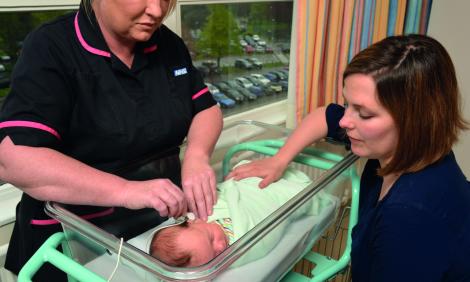Newborn hearing screener
Newborn hearing screeners help and support families with vital information about their babies' hearing.
Working life
All new parents are offered a hearing screening test in the first few weeks after their baby is born.
Working on neonatal units, post-natal wards and in clinics, newborn hearing screeners help identify babies that need testing and explain the screening procedure to parents. They also:
- make sure the equipment is working
- use equipment to screen babies
- give the parent or guardian the screening results and explain what happens next
- input the results onto a computer system
As a newborn hearing screener, you'll work as part of the audiology team with healthcare scientists, neonatal nurses, GPs and health visitors. You'll have a lot of contact with parents and their babies.
Entry requirements
There are no set entry requirements for newborn hearing screeners. Employers expect a good standard of numeracy and literacy and may ask for GCSEs or equivalent. They may ask for a nursery nursing or child-care related qualification, such as NNEB, BTEC or vocational qualification.
Employers usually ask for experience of working with children and families. They may also ask for experience of working with deaf people. This can be either or paid or voluntary work.
Personal characteristics and skills needed
As a newborn hearing screener, you need to be:
- happy to handle newborn babies
- calm and reassuring
- able to explain procedures to parents
- willing to work with people from all walks of life
- able to work as part of a team but use their initiative
- able to follow instructions
- able to use equipment
You'll also need:
- very good communication skills
- good customer care skills
- organisational skills
Training and development
You will be given the training you need for the job including how to use the equipment, health and safety and child protection. You may also have the opportunity to get a qualification by doing an apprenticeship. Newborn hearing screeners can join the British Society of Audiology (BSA) as associate members. The BSA offers conferences and meetings where hearing screeners can update their skills and network with others working in the field.
-
Clinical support staff working in the NHS are paid on the Agenda for Change (AfC) pay system. As a newborn hearing screener you will typically be on AfC band 3. As a healthcare It may be possible to apply for more senior positions - eg as an assistant practitioner, after further training and experience. Newborn hearing screeners work standard hours of around 37.5 a week. Some may work shifts, which could involve nights, early starts, evenings and weekends. Terms and conditions will usually be different for clinical support staff working outside of the NHS.
-
You could become a newborn screening coordinator, supervising and organising the work of a team of screeners.
You could move into other jobs in the wider healthcare team or with the appropriate qualifications for entry to university, you could apply to train as a healthcare professional, such as a midwife or nurse or as an audiologist.
If you're applying for a role either directly in the NHS or in an organisation that provides NHS services, you'll be asked to show how you think the NHS values apply in your everyday work. Find out more about NHS values.
Most NHS trusts advertise their vacancies on NHS Jobs. You can find just some of the current vacancies below.
-
School Entry Hearing Screener
Llantrisant/ Bridgend/ Merthyr Tydfil, CF72 8XR
- Salary :
- £25313.00 to £26999.00
- Type :
- Permanent
- Employer :
- Cwm Taf Morgannwg University Health Board
-
Senior Sister - Newborn Services
Manchester, M13 9WL
- Salary :
- £47810.00 to £54710.00
- Type :
- Permanent
- Employer :
- Manchester University NHS Foundation Trust
-
Staff Nurse - Newborn Services
Manchester, M13 9WL
- Salary :
- £31049.00 to £37796.00
- Type :
- Permanent
- Employer :
- Manchester University NHS Foundation Trust
-
Antenatal and Newborn Screening Failsafe Officer
Nottingham, NG5 1PB
- Salary :
- £24937.00 to £26598.00
- Type :
- Fixed-Term
- Employer :
- Nottingham University Hospitals NHS Trusts
-
New-Born Hearing screener and admin assistant
Torquay, TQ2 7AD
- Salary :
- £24937.00 to £26598.00
- Type :
- Fixed-Term
- Employer :
- Torbay and South Devon NHS Foundation Trust
-
Band 8a Antenatal and Newborn Screening Coordinator
Romford, RM7 0AG
- Salary :
- £12326.20 to £13724.60
- Type :
- Permanent
- Employer :
- Barking, Havering and Redbridge University Hospitals NHS Trust
-
Antenatal Newborn Screening- Admin Support and Failsafe Officer
Carshalton, SM5 1AA
- Salary :
- £29651.00 to £31312.00
- Type :
- Permanent
- Employer :
- Epsom and St Helier University Hospitals NHS Trust
Showing 6 of 7 results





